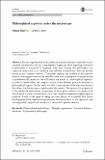Files in this item
Philosophical expertise under the microscope
Item metadata
| dc.contributor.author | Egler, Miguel | |
| dc.contributor.author | Ross, Lewis D. | |
| dc.date.accessioned | 2018-04-04T11:30:13Z | |
| dc.date.available | 2018-04-04T11:30:13Z | |
| dc.date.issued | 2018-03-16 | |
| dc.identifier | 252520994 | |
| dc.identifier | 46b7b9df-1a69-4803-b4eb-620549ee1eec | |
| dc.identifier | 85044073222 | |
| dc.identifier | 000519902900008 | |
| dc.identifier.citation | Egler , M & Ross , L D 2018 , ' Philosophical expertise under the microscope ' , Synthese , vol. First Online . https://doi.org/10.1007/s11229-018-1757-0 | en |
| dc.identifier.issn | 0039-7857 | |
| dc.identifier.uri | https://hdl.handle.net/10023/13069 | |
| dc.description | Funding: Carnegie Trust for the Universities of Scotland. | en |
| dc.description.abstract | Recent experimental studies indicate that epistemically irrelevant factors can skew our intuitions, and that some degree of scepticism about appealing to intuition in philosophy is warranted. In response, some have claimed that philosophers are experts in such a way as to vindicate their reliance on intuitions—this has become known as the ‘expertise defence’. This paper explores the viability of the expertise defence, and suggests that it can be partially vindicated. Arguing that extant discussion is problematically imprecise, we will finesse the notion of ‘philosophical expertise’ in order to better reflect the complex reality of the different practices involved in philosophical inquiry. On this basis, we offer a new version of the expertise defence that allows for distinct types of philosophical expertise. The upshot of our approach is that wholesale vindications or rejections of the expertise defence are shown to be unwarranted; we must instead turn to local, piecemeal investigations of philosophical expertise. Lastly, in the spirit of taking our own advice, we exemplify how recent developments from experimental philosophy lend themselves to this approach, and can empirically support one instance of a successful expertise defence. | |
| dc.format.extent | 22 | |
| dc.format.extent | 345190 | |
| dc.language.iso | eng | |
| dc.relation.ispartof | Synthese | en |
| dc.subject | Philosophical methodology | en |
| dc.subject | Thought experiments | en |
| dc.subject | Expertise defence | en |
| dc.subject | Intuitions | en |
| dc.subject | Experimental philosophy | en |
| dc.subject | B Philosophy (General) | en |
| dc.subject | T-NDAS | en |
| dc.subject.lcc | B1 | en |
| dc.title | Philosophical expertise under the microscope | en |
| dc.type | Journal article | en |
| dc.contributor.institution | University of St Andrews. Philosophy | en |
| dc.identifier.doi | https://doi.org/10.1007/s11229-018-1757-0 | |
| dc.description.status | Peer reviewed | en |
This item appears in the following Collection(s)
Items in the St Andrews Research Repository are protected by copyright, with all rights reserved, unless otherwise indicated.

